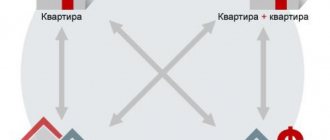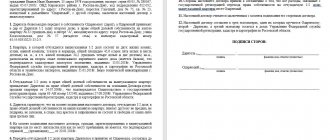Home / Real estate / Purchasing real estate / Housing exchange
Back
Published: 01/28/2018
Reading time: 8 min
0
494
According to the laws (Civil Code and Housing Code of the Russian Federation), there are no benefits for related exchange. In this case, the exchange agreement is considered similar to the purchase and sale agreement, with both parties being sellers and buyers. According to the law, it is possible to exchange both privatized and non-privatized apartments.
- Legislation
- Registration procedure
- Documentation
- Taxes
- Exchange of shares
- Features of the exchange of social rental apartments
- Risks
- conclusions
During the Soviet era, exchanging an apartment was often the only way to improve one’s living conditions. Nowadays, it is much easier to improve your place of residence - by purchasing a new apartment.
However, even now exchanging an apartment is a fairly popular method, especially among relatives. Such an exchange allows some to move to a more spacious room, and others to get rid of unnecessary utility bills.
Legislation
General provisions on exchange are given in Art. 567 Civil Code of the Russian Federation. In accordance with it, during an exchange, each party must transfer the premises (goods) into the ownership of the other party in exchange for another premises.
In this case, the exchange is carried out according to the rules that are true for the purchase and sale agreement, and each of the parties is both the seller and the buyer of the goods (residential premises).
The basic requirements for an exchange agreement are given in Art. 153-162 Civil Code. Including the need to draw up an agreement in writing if the transaction price exceeds 10,000 rubles.
The current Housing Code of the Russian Federation does not contain the concept of related exchange. When exchanging an apartment with a relative, the law does not provide any benefits. The parties to the agreement are subject to the same exchange rules for all citizens.
Along with the exchange of privatized premises, it is possible to exchange non-privatized residential premises received under a social tenancy agreement, which is stated in Article 72 of the Housing Code.
Instructions for exchanging shares in apartments between relatives
If it is absolutely necessary to conclude an exchange agreement (for example, if there is no trust between the parties to the agreement), then this can only be done with the consent of all participants in the transaction. And in this case, the conversation is not only about the owners of shares, but also about the co-owners of other shares in the apartment. They must renounce their pre-emptive right to buy out the share, because this agreement in this regard is considered precisely as a purchase and sale.
Example: When selling any share in an apartment, the owner must first offer to buy it to the other owners and only then, if the latter refused or were unable to purchase the property, sell it to a third party. And it doesn’t matter whether this person is a relative or not. An exchange agreement is no exception here, and in order to realize the opportunity to exchange shares, you need to make sure that all parties (including co-owners) agree to this option and will not claim the same share based on the preemptive right.
In the case of the gift agreement mentioned above, the preemptive right is not used and therefore the share can be freely transferred free of charge to another person (including a relative). However, in our case, it turns out that 2 gift agreements will be concluded at once, which can be regarded by other homeowners as a fictitious transaction. As a result, it can be easily challenged in court.
Procedure
- Make an offer to purchase/exchange a share in an apartment on the same terms as the owner intends to exchange with a relative.
- Send such proposals to all co-owners. It is better against signature, by registered mail or in any other way, which can then, if anything happens, be confirmed in court.
- Wait 10 days (or more) from the moment all owners receive the offer (clause 2, article 250 of the Civil Code of the Russian Federation). If none of them wanted to purchase a share, you can continue the procedure.
The situation with exchanging shares in an apartment is very controversial and requires an extremely careful approach. According to the rules, the seller is obliged to present to potential buyers-co-owners the same conditions as to the relative with whom he plans to exchange shares. But, as a rule, the exchange involves obtaining specific real estate in another area of the city or even a region of the country. On the one hand, this is completely legal. On the other hand, co-owners may file a lawsuit to declare the transaction illegal due to the fact that the conditions are unfulfillable. It is recommended to enlist the help of an experienced lawyer. Alternatively, the proposal can indicate several options for purchasing a share: direct exchange for specific real estate or a substantial amount for which this real estate could be purchased with a good margin.
- Draw up a barter agreement between relatives.
- Register the contract and re-register ownership rights.
Documentation
An approximate list of documents for concluding an exchange agreement:
- Passports of the parties to the transaction.
- Application for re-registration of property rights (submitted to Rosreestr at the last stage).
- An extract from the Unified State Register of Real Estate on the existence of ownership rights to the share that is supposed to be changed (needed from each party). Alternatively, there may be another document, for example, a certificate of registration of ownership.
- Direct agreement for the exchange of premises.
Potentially, a spouse's consent may be required for the share exchange or any other documents, depending on the situation. Here, too, the help and advice of an experienced lawyer will not hurt.
Expenses
In a normal situation, if the help of a notary and additional documents are not required, the only type of expense will be the state duty for re-registration of property rights in the amount of 2,000 rubles per person. Since at least 2 parties are involved in the exchange, they must pay 4,000 rubles.
Deadlines
Due to the fact that a regular exchange agreement does not depend on external factors, the only real deadline that can be guided by will be the very fact of re-registration of documents for the share in Rosreestr. This procedure can take from 3 days to 1 month. Most often 1-2 weeks. Everything else is individual and directly depends on the owners.
Example: The parties can agree on an exchange in a few hours, and then immediately send offers to purchase the share to the co-owners. If they immediately refused, then you can move on. If not, you will have to wait 10 days. After this, it is enough to draw up and sign an exchange agreement in a few hours (or even minutes) and submit an application for re-registration of ownership on its basis.
Agreement for the exchange of shares of an apartment between close relatives (sample)
An exchange agreement usually does not require notarization, but does not exclude it. Thus, if necessary, either party can insist that the document be certified according to all the rules.
In such a situation, the insisting party must understand that most likely all the costs of paying for the notary’s services will fall on it.
If the agreement is equal, then it is enough to simply indicate that one share is exchanged for another. If the shares are not equal (not so much in size as in price, because 1/10 share in an apartment in Moscow can cost much more than half an apartment in a village in another region), then it is necessary to provide a clause on compensation for the difference. (there is such a moment in the sample below).
In addition, the contract must include the following elements:
- Full passport details of all parties.
- Comprehensive information about the share, down to the number of floors, area (residential/non-residential) and so on.
- Information about the title documents on the basis of which the parties own the shares and received them into ownership (for example, a purchase and sale agreement and an extract from the Unified State Register of Real Estate).
- Data on the presence/absence of persons who, at the time of concluding the exchange transaction, have the right to reside in the specified shares. For example, someone is temporarily registered or renting a share. In addition, it would not be amiss to stipulate (and indicate in the contract) the rules for the further residence or eviction of such persons.
- Presence or absence of encumbrances.
Sample sample share exchange agreement:
Registration procedure
The procedure for registering a related exchange of privatized apartments includes the following steps. Necessary:
- Assess the quality of housing. At this stage, the need for additional payment is assessed.
- Prepare the apartment for sale. Removal of encumbrances, payment of all debts.
- Obtain a technical passport of the BTI (if it is missing).
- Conclude an exchange agreement.
- Transfer housing according to the transfer and acceptance certificate.
- Submit documents to Rosreestr or MFC for registration of ownership rights.
- Receive an extract from the Unified State Register of Real Estate.
- If necessary, submit documents to the tax office.
- Re-register documents with the management company.
If there are minor citizens living there, it is necessary to obtain permission from the guardianship authorities. This is due to the fact that, in accordance with the law, such an exchange should not worsen the child’s living conditions.
If he is the owner of part of the apartment, then when moving to a new apartment his share should also not decrease.
For example, when moving from a two-room apartment, part of which belongs to a child, to a one-room apartment. At the same time, the number of square meters per child should remain unchanged. Thus, the child can become the owner of almost the entire new apartment.
Where to go?
When all the work has been completed, you can begin to formalize the apartment barter transaction between relatives. First, you need to estimate the total cost of your home and your opponent’s home. If the prices are reasonable, you can proceed to drawing up a contract, but if not, it’s worth talking about additional payment.
After this, you either draw up a contract yourself, without notarization, or contact a notary office .
There the document is checked, assigned a number and entered into Rosreestr.
If one of the parties fails to fulfill its obligations, this agreement will be good evidence in court.
Taxes
Since the exchange of real estate is equated to a purchase and sale, it is considered that each of the apartment sellers received income on which he must pay personal income tax. According to the law, this tax is 13% of the value of the subject of the transaction. In this case, you can use tax deductions.
Sellers of apartments who have owned them for more than 3 years are exempt from this tax, and from 2021 - for more than 5 years.
Therefore, sometimes it is more profitable not to exchange an apartment, but to donate it if the transaction is made between close relatives. In this case, no tax is charged.
The danger of replacing exchange with donation is that in case of disputes in the first case, the property will return to the original owners, and in the second case it will be necessary to prove the illegality of the transaction in each gift transaction.
What exchange options are most often used?
Most often, relatives use this exchange:
- apartments for apartments,
- shares of the apartment,
- rooms for an apartment.
Possible methods of exchanging real estate between close relatives directly depend on the goals pursued by citizens:
- improving the living conditions of one or both parties,
- obtaining property benefits if the exchange of privatized apartments with relatives involves a monetary surcharge,
- moving to another locality or region of the country, if intercity exchange is carried out,
- resolving a dispute about cohabitation if citizens initiate a forced exchange of an apartment.
The specific methods of making an exchange depend on the specified reasons, as well as on the legal status of the property.
For apartments owned by relatives, this method will be to carry out a civil transaction with mutual registration of rights to newly acquired objects.
The option of exchanging with the participation of municipal apartments is significantly limited by the mandatory requirement to obtain the consent of the owner of the fund or the landlord. In this case, the lack of permission will not allow citizens to exchange their apartment under any circumstances.
Another way to exchange apartments between relatives is not to draw up documents with legal force for residential premises, but to mutually extract and register citizens.
Such actions can only be performed in relation to municipal apartments and with the consent of the landlord. This option is the most labor-intensive and can only be implemented if many formalities are observed.
Features of the exchange of social rental apartments
According to Art. 72 of the Housing Code, persons living in apartments received for social rent can also exchange them. In this case, there may be exchange options:
- 2 non-privatized apartments;
- non-privatized and privatized apartments.
In the first case, the exchange occurs according to the following algorithm:
- An exchange agreement is concluded.
- An application is submitted to the municipality with an agreement attached.
- Within 10 days, the management body will consider the issue and, if the decision is positive, will issue a warrant for occupancy.
- Documents for registration are submitted.
In the second case, the simplest option is the privatization of a non-privatized apartment with the subsequent conclusion of an exchange agreement.
If privatization is impossible (for example, the tenant has already privatized the home before), other approaches can be used. For example, by moving a child into a non-privatized apartment and then concluding a social tenancy agreement. A privatized apartment is transferred through a donation or sale agreement. But this path is fraught with the possibility of losing the apartment due to the dishonesty of one of the relatives.
Tax when renting out an apartment is the topic of our detailed material!
How to quickly get a room in a hostel and which of the residents has every right to this? Find out all the information you need in our article.
Do you want to pay for your apartment safely and not suffer from scammers? Our article will help you!
Exchange of shares with a minor child between relatives
The main difference between an exchange agreement in which a minor child (like any incompetent person) will participate is the mandatory need for notarization. That is, if in the previous case it was enough to simply sign an agreement and, on its basis, make changes to the ownership right, and the notary was “optional,” then here he is already required. In addition, permission from the guardianship authorities will have to be added to the list of documents. The rest of the documents are no different.
Agreement for the exchange of shares of an apartment with a minor (sample)
Risks
With related exchange, the risks are noticeably reduced, since it can be assumed that relatives are unlikely to deceive each other. However, in life there are different relatives and different situations, and therefore you need to know the weak links of the exchange transaction.
Market specialists believe that during an exchange the risks are much greater than, for example, during a purchase and sale transaction. This is due to the fact that the exchange is carried out in several stages.
At the same time, the cause of loss of time and money can be either fraud or a frivolous approach to the preparation and execution of documents.
For a successful exchange, it is desirable to fulfill the following conditions of the transaction:
- integrity of partners;
- simultaneous sale and purchase of apartments;
- lack of apartments purchased with a mortgage or using maternity capital;
- absence of minor owners;
- absence of incapacitated owners, as well as owners who are alcoholics and drug addicts.
Where to start?
Exchange is a complex of legally significant actions and decisions that relatives must make simultaneously with two privatized apartments.
How to do everything correctly, from a legal point of view, and carry out the real estate exchange process in a short time? This procedure begins with determining the legal status of residential premises. Further, citizens must give preference to a specific method of making barter.
If the housing is owned by the parties, the transaction begins with the preparation of documents and an exchange agreement. Citizens can carry out all the necessary actions when making an exchange between related families independently or with the help of a qualified intermediary, lawyer or realtor.
The option of related exchange of an apartment for an apartment in municipal ownership begins with obtaining permission from the authorized bodies for the disposal of property.
In this case, the first stage of the exchange will be the simultaneous appeal of citizens to the owner or landlord of the housing stock.
Registration costs and terms
How much does it cost and what should I pay for? When making an exchange transaction, the parties exchange real estate at the same time, however, the state registration procedure is carried out within 7 working days from the date of application, and if the documents are submitted through the MFC - 9 working days.
To complete registration actions, it will be necessary to pay a state fee in the amount of 2 thousand rubles.
If citizens live in apartments on social rent and exchange premises through municipal authorities, the deadline for processing documents may be set by local authorities.
As a rule, the total duration of work does not exceed two months. The procedure and amount of payment of the necessary fees and charges are also established for each municipality.
About methods of related exchange
The first and simplest option is to draw up a simple exchange agreement. In this case, the parties simply exchange residential premises that they own. And each of the parties simultaneously performs the functions of acquirer, alienator, and seller.
It is decided by individual agreement whether such a transaction will be of equal value or not. The contract can include any conditions regarding additional payment, both for one and for the other party.
Instant registration with Rosreestr along with certification by a notary is acceptable. The agreement is subject to taxes at 13 percent.
There is another way to carry out an exchange with close relatives - drawing up an agreement for the purchase or sale of apartments. This method is used by those who are interested in saving as much money as possible. Or those who simply don't trust the exchange.
The agreement is drawn up in two copies. And for each of them, notarization is required. At the final stages, the deal is finalized by contacting Rosreestr.
You can make a donation, but this method is the most expensive. After all, this procedure is subject to serious taxes if close relatives do not participate in it.
What to do if the hot water is turned off without warning? Step-by-step instructions are in this article.
Articles regulating the exchange procedure.
Mena
A sample document is presented below. It is used to check the text during the process of formalizing the exchange of shares between relatives. To complete the standard procedure, one copy is sufficient, which is submitted to Rosreestr.
With the help of this agreement, it is possible to clarify the special procedure when both objects are not privatized. In this case, it is necessary to prepare the following documents for subsequent transfer to the local administration of municipal authorities:
- civil passports of the parties;
- existing social rental agreements with official permissions for the right to occupy a certain living space (orders);
- certificates about the actual composition of families;
- consent of other relatives (owners) to the corresponding exchange of shares;
- standard consents of guardianship authorities (for minors and incapacitated family members, registered owners);
- written confirmation of the absence of debt for utility services.
This method is convenient because the administration does not in any way check the equivalence of the objects of exchange of shares between relatives. Responsible employees check the correctness of completion and composition of the submitted documents, but do not pay attention to the financial component of the transaction. Valid calculations can be made without notifying government authorities. The fact of payment is confirmed by a receipt. For secure transactions with wire transfers and paper bills, you should use banking services - escrow account and safe deposit box, respectively.
The legal refusal of municipal authorities is permissible in the following cases:
- the building (part of the premises) is unsuitable for habitation according to current building codes;
- during the period of the transaction, major repairs or demolition of the house are planned (performed);
- the property is registered under the “official” category, and therefore cannot be transferred to private ownership;
- one of the participants in the exchange of shares suffers from a dangerous disease, sanitary standards prohibit (limit) contacts with others.
You can download the exchange agreement using this link.
Three important exchange points: Rosreestr, notary, taxes
Regardless of the form in which relatives exchanged shares in the property they own, all documents related to the transaction are drawn up by a notary. The notary certifies the authenticity of contracts with his signature and seal.
The next step will be registration of new documents in the Unified State Register of Real Estate . It is done by the shareholders themselves (in the MFC) or by a notary. Registration of submitted documents is not an automatic process. First, the correctness of the exchange will be checked, the presence of encumbrances, injunctions, and debts in terms of real estate taxes. If everything is in order, new entries are made in the Rosreestr database - the real estate transaction can be considered completed.
The need to pay tax on a related exchange of shares arises if these shares have different values. This legal requirement remains in effect even if the price difference is minor. What can be exempt from income tax? The tenure of real estate is more than 3 years (if the property was registered before January 1, 2021) or more than 5 years (if after the above date). The personal income tax return must be submitted to the tax office no later than April 30 of the year following the conclusion of the transaction. Payment must be made by July 15 (inclusive).
Money and taxes, benefits and risks
As you know, any legal manipulations have different consequences in terms of profitability or disadvantage for the subject (that is, for the person involved in the transaction). It is logical that people strive to solve their problems as profitably as possible and to save whenever possible. First, let's remember what the state claims when its citizens sell their property.
Do I need to pay taxes on the sale of an apartment?
A transaction in which a person receives a financial gain results in a tax liability. The current legislation of the Russian Federation (specifically the Tax Code, Article 20) establishes the following:
- if the owner has owned the property for more than 3 years, he does not have to pay any taxes on the sale;
- if the owner has owned the property for less than 3 years, he must pay 13% of the amount received from the sale to the state treasury;
- in this case, the seller can receive a property tax deduction in the amount of how much the apartment purchased in return costs (but not more than 1 million rubles).
Tax evasion and its consequences
To get out from under the pressure of tax obligations, sellers often list the cost of an apartment as less than 1,000,000 rubles, literally 999,000, etc. As a result, a person does not have to pay any taxes on an apartment that has been his property for less than three years.
But is this path really safe? Let's think about it:
- since no one has canceled the risks of a reverse transaction (for various reasons, often beyond the control of the buyer), if it is declared invalid, the return of the actual amount is unlikely. Because the letter of the law confirms a smaller amount, and the seller will win any court case if the buyer decides to sue him;
- Serious prices are circulating in the real estate market today, and in most cases we are talking about amounts much, much more than 1 million rubles. – 3, 5, 8 or more. Clearly no one has any desire to risk such amounts of money. But I don’t want to pay taxes “for anything.” What to do?
Attention! Contact competent lawyers. Their help is priceless; they will tell you how to get the maximum benefit from an exchange through purchase and sale and not lose your money.
- Each situation is individual. It is necessary to take into account the data for one apartment and compare it with the data for another apartment. Carefully calculate who is owed a tax payment and who is not. Also important is the degree of trust between the exchanging parties, as well as personal awareness of the purity of the origin of ownership of the apartment being purchased.
No matter how complex the apartment exchange may be, its safety is ensured by a reasonable approach. In particular, remember the importance of professional participation by competent specialists. Legal against the backdrop of the security you receive.
Possible reasons for refusal
If citizens exchange residential properties that belong to them by right of ownership, the only grounds for refusal can be violations in the preparation of contracts. Owners have the right to independently dispose of their housing, and restrictions on this right can only be established by law.
For the exchange of municipal housing, the reason for refusal may be the reluctance of the landlord to carry out this procedure. In addition, during the verification of documents, a deliberate deterioration in living conditions for one or both parties may be established, which will also lead to a refusal of registration.




![Bank Zenit mortgage and refinancing [credit][sale]](https://bgrielt.ru/wp-content/uploads/bank-zenit-ipoteka-i-refinansirovanie-credit-sale4-330x140.jpg)




